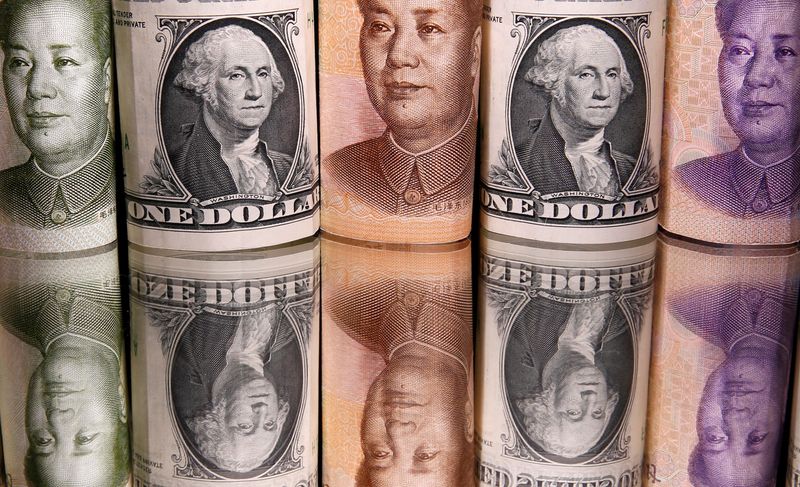By Ankur Banerjee
SINGAPORE (Reuters) - A spurt in the U.S. dollar and China's defence of the yuan are forcing Asian central banks to step up interventions in their weakening currencies, and one clear casualty is their desire to slowly ease monetary policy to shore up cooling economic growth.
Central banks from Indonesia, South Korea and the Philippines kept rates unchanged as expected this month.
But investors who were hoping they would hint at eventual rate cuts, citing cooling inflation and the need for stimulatory economic settings, found instead the focus had turned to currency weakness.
"Asian central banks are quite cautious about premature rate cuts," said Moh Siong Sim, a currency strategist at Bank of Singapore.
"They don't want to be in a situation of premature easing and the rhetoric is starting to change as well," Sim said, pointing to Bangko Sentral ng Pilipinas' message on keeping the door open to future hikes.
"I think that's a signal that the currency weakness is starting to figure into the thinking."
Besides making clear that they discourage speculation in their currencies, the Reserve Bank of India and Bank Indonesia have stepped into markets over the past few days to support their depreciating currencies. Central banks in the Philippines and Thailand have warned they may do the same.
In contrast, Latin American central banks have kicked off monetary easing cycles, with Brazil's central bank cutting rates by more than expected at the start of the month.
In Asia's backyard, China has stepped up efforts to defend the yuan after its 5% sharp decline fuelled by a faltering post-pandemic economic recovery and widening yield differentials with major economies.
That's forcing its peers in Asia to shift focus from mere export competitiveness to currency stability and capital flows.
INDIRECT MEASURES
Bank Indonesia kept policy rates unchanged on Thursday, but highlighted its intent to keep the rupiah stable.
While the currency is up 2% against the dollar this year, it has weakened recently as expectations that the Federal Reserve will keep rates higher for longer lifted the dollar and U.S. yields.
Indonesia's current account swung into a deficit for the first time in two years in the second quarter.
"All countries are experiencing currency depreciations, our focus is to stabilise the exchange rate through intervention," Bank Indonesia Governor Perry Warjiyo said.
Bank Indonesia also announced it will auction new short-term certificates from next month, a move aimed at attracting foreign investment inflows even as U.S. yields rise.
"For the rupiah, it's been more a case of not responding to their much better inflation numbers, but perhaps worrying a bit more about the current account, ... which is no longer providing quite so much support to the currency," said Rob Carnell, ING's regional head of research for Asia-Pacific.
"They've been holding back from easing and I think basically waiting for a point where either the U.S. dollar unilaterally starts to weaken or such time where this higher-for-longer view starts to crumble."
South Korea is not ruling out a rate cut by year end, despite a wobbly won that's down over 5% this year against the dollar.
The Philippine peso has slipped nearly 2%, having touched a nine-month low last week on concerns over China and the Fed.

Analysts expect Asian central banks to eventually start cutting interest rates, although most seem reluctant to start monetary easing until next year, when the hope the Fed's plans and inflation trends will be more clear, a Reuters poll shows.
"This is just a sort of period they've got to get through," ING's Carnell said. "If they can sort of weather this by doing nothing. By not cutting, but just sort of sitting with rates at a modest modestly restrictive level."